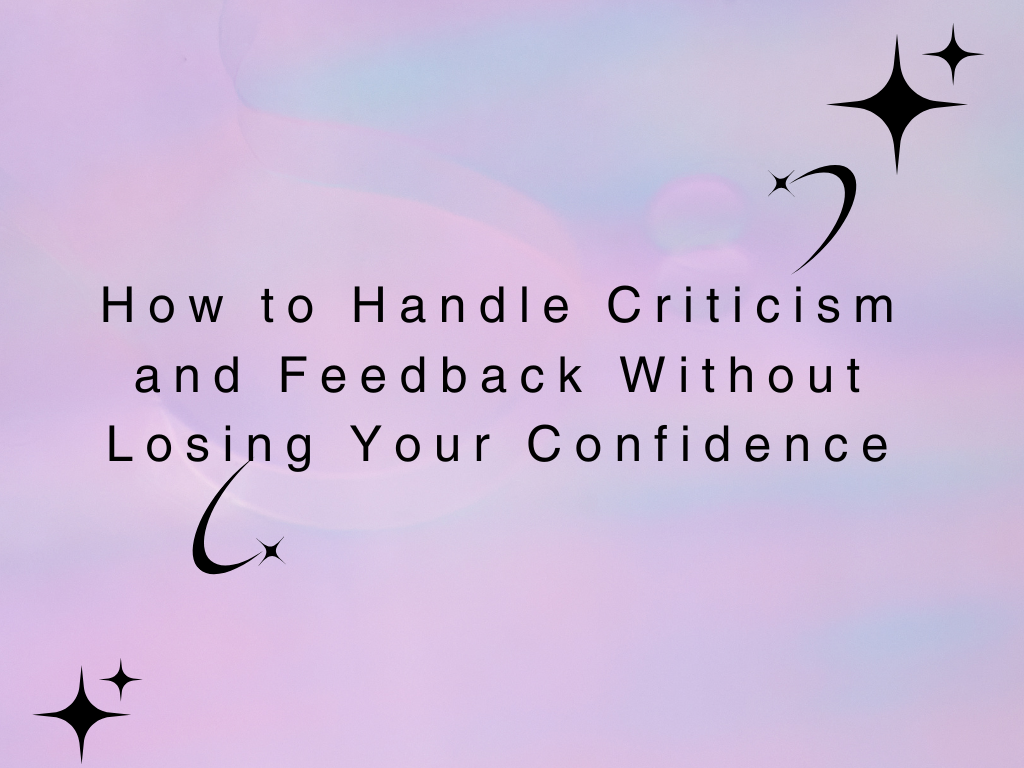Receiving criticism can be one of the hardest parts of being a writer. Whether it’s feedback from a friend, a beta reader, or an editor, it’s easy to feel vulnerable and discouraged. But the truth is, constructive criticism is a powerful tool for growth. Learning how to accept and use feedback without letting it chip away at your confidence is essential for long-term success. Here’s a guide to handling criticism while maintaining your creative self-esteem.
1. Shift Your Mindset: View Criticism as a Tool for Growth
It’s natural to feel defensive when someone critiques your work, but remember that criticism isn’t a personal attack. It’s simply a way to improve your craft. Instead of seeing feedback as something negative, try reframing it as an opportunity to grow. Every piece of feedback gives you insight into how you can make your writing stronger.
Tip: Take a deep breath and pause before reacting. Give yourself time to process the feedback without immediately jumping into defense mode.
2. Separate Yourself from Your Work
As a writer, it’s easy to become emotionally attached to your work. After all, you’ve poured your heart and soul into it! But to avoid taking criticism personally, it’s important to separate yourself from your writing. Your work is a reflection of your skill at a particular moment, but it doesn’t define your worth as a person.
Tip: Remind yourself that feedback is about improving your work, not you as an individual. Try to detach your personal feelings from your creative output.
3. Ask for Specific Feedback
Sometimes, criticism can feel vague or unhelpful. If you’re unsure about a comment, don’t be afraid to ask for clarification. The more specific the feedback, the easier it is to understand what needs improvement and how to address it.
Tip: Instead of just accepting general comments like “This part doesn’t work,” ask questions like, “What specifically didn’t work for you?” or “Can you point out what I can improve here?”
4. Take Your Time to Reflect
The first reaction to criticism is often emotional, and that’s okay. However, giving yourself time to reflect can help you respond more constructively. Step away from the feedback for a day or two before revisiting it. With some distance, you may find that the criticism makes more sense or that you view your work differently.
Tip: If feedback initially stings, sleep on it. You may wake up with fresh eyes and a new perspective.
5. Focus on What You Can Control
Not all feedback will resonate with you, and that’s okay. Sometimes, the suggestions given may not align with your vision for your work. Focus on the feedback that helps you grow and make changes that feel right for your story. You have the final say in how you incorporate feedback into your writing.
Tip: Evaluate feedback carefully and determine whether it aligns with your voice and your goals. Don’t feel pressured to change everything based on someone else’s opinion.
6. Keep Your Long-Term Goals in Mind
Writing is a journey. Every critique, every revision, and every piece of feedback contributes to your development as a writer. Remind yourself of your long-term writing goals, and don’t let one piece of criticism derail your progress. In the grand scheme of your writing career, feedback is just one small part of the process.
Tip: Keep a journal of your writing goals and revisit it whenever you feel discouraged. This can help you refocus on your bigger picture.
7. Surround Yourself with Supportive People
Seek out beta readers, critique partners, or mentors who offer constructive feedback in a supportive manner. A positive and nurturing feedback environment will help you feel more confident and willing to accept suggestions.
Tip: Create a “support team” of people who understand your vision and can provide honest, but kind, feedback. Having a trusted group to share your work with can make criticism easier to handle.
Connect with fellow authors here!
8. Learn to Celebrate Small Wins
As a writer, it’s easy to focus solely on areas that need improvement. However, don’t forget to celebrate your achievements along the way. Whether it’s finishing a chapter or receiving positive feedback on a scene, acknowledging your progress helps build confidence.
Tip: After reviewing critical feedback, take a moment to celebrate what went well. Reflect on the positive aspects of your work before diving into areas that need revision.
9. Remember: Even Famous Writers Face Criticism
It might help to know that even the most celebrated authors face criticism. The key is not to avoid feedback, but to use it to improve. Writers like J.K. Rowling and Stephen King received rejection letters and harsh criticism before they achieved their success. The difference between them and others is that they kept going despite the setbacks.
Tip: Remember that every writer, no matter how successful, has faced rejection and criticism. It’s part of the process, not a reflection of your abilities.
10. Trust Your Instincts
Finally, always trust your gut. While feedback is helpful, your intuition as a writer is just as important. If you believe in the integrity of your story, don’t let one piece of criticism shake your confidence. Use feedback as a tool for growth, but stay true to your vision.
Tip: After reflecting on feedback, ask yourself if the suggested changes align with your creative vision. If something doesn’t feel right, trust your instincts.
Conclusion
Criticism doesn’t have to be the enemy of your confidence. With the right mindset, it can become one of your greatest allies in the journey toward becoming a stronger, more refined writer. Embrace feedback as part of your growth, and remember that confidence comes not from avoiding criticism, but from learning to handle it with grace and resilience.
By staying open to feedback, maintaining your sense of self-worth, and trusting in your ability to grow, you’ll be well-equipped to navigate the ups and downs of the writing process. Keep writing, keep improving, and above all, keep believing in yourself!

